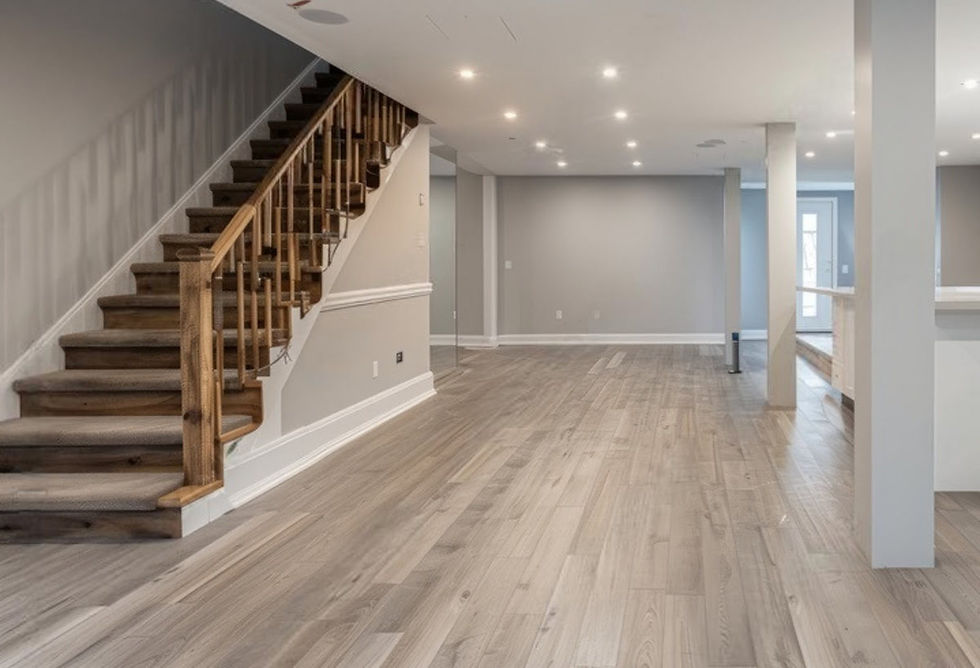Challenges of Picking the Best Flooring for a Basement
- alex87032
- Jun 14, 2024
- 3 min read
Basements have evolved from mere storage spaces to valuable living areas, offering extra square footage for activities like home gyms, entertainment rooms, and guest suites. However, turning your basement into a comfortable living space requires careful consideration, particularly regarding flooring. Selecting the right flooring for below-grade spaces presents unique challenges due to environmental factors like moisture.
Moisture Management
Moisture is a significant issue for basements. Without proper management, moisture can ruin flooring and promote mold growth, compromising indoor air quality.
Moisture Sources:
Moisture Source | Description |
Condensation | Temperature differences between upper floors and basements can lead to condensation. |
Foundation Seepage | Tiny cracks in the foundation allow water to infiltrate, especially during heavy rainfall. |
Plumbing Issues | Leaks in water supply lines or drainage systems introduce moisture into the basement. |
Moisture Mitigation Strategies
To combat moisture, consider the following strategies:
Strategy | Description |
Vapor Barriers | Install polyethylene sheeting or similar materials to prevent moisture from migrating. |
Dehumidification | Use mechanical dehumidifiers to keep humidity levels between 30-50%. |
Waterproofing | Apply sealants or waterproofing compounds to foundation walls and floors. |
Proper Drainage | Ensure good exterior grading and functional gutters to direct water away from the foundation. |
Additional Considerations for Basement Flooring
Choosing basement flooring involves more than just selecting a material. Consider these additional factors:
Thermal Insulation. Flooring materials with insulative properties or insulating underlayments can enhance thermal comfort, making your basement cozy.
Structural Integrity. Basements can settle or experience minor movements over time. The flooring system must accommodate these changes without cracking or buckling.
Chemical Resistance. If your basement serves as a laundry room or workshop, the flooring should resist common household chemicals and cleaners.
Acoustic Properties. Choose flooring with sound-dampening characteristics to reduce noise transmission between the basement and upper floors.

Best Flooring Options for Basements
Consider the long-term maintenance needs of different flooring options, including cleaning protocols, refinishing schedules, and potential repair procedures.
Let’s break down the pros and cons of popular basement flooring options.
1. Ceramic and Porcelain Tile
Advantages | Disadvantages |
Exceptional water resistance | Cold underfoot without supplemental heating |
High durability and longevity | Requires professional installation |
Vast aesthetic options | Can crack if the subfloor isn’t properly prepared |
Resistant to chemicals and stains |
2. Luxury Vinyl Plank (LVP) and Luxury Vinyl Tile (LVT)
Advantages | Disadvantages |
Water-resistant | May scratch or dent |
Comfortable underfoot, especially with padded underlayment | Some cheaper options might emit volatile organic compounds (VOCs) |
DIY-friendly installation | |
Wide range of styles mimicking natural materials |
3. Epoxy Flooring
Advantages | Disadvantages |
Seamless, waterproof surface | Requires professional installation |
Extremely durable and chemical-resistant | Can be cold and hard underfoot |
Customizable appearance with coloured flakes or metallic additives | May yellow over time with UV exposure |
4. Engineered Hardwood
Advantages | Disadvantages |
Provides the warmth and aesthetics of natural wood | Not recommended for high-moisture areas |
More dimensionally stable than solid hardwood | Requires careful acclimation before installation |
Can be refinished (depending on veneer thickness) | More expensive than synthetic options |
5. Polished Concrete
Advantages | Disadvantages |
Utilizes existing concrete slab | Cold underfoot |
Extremely durable and low-maintenance | May require significant surface preparation |
Can be stained or textured for enhanced aesthetics | Limited colour options compared to other flooring types |
Installation Considerations
Choosing the best flooring for a basement is only half the battle. Proper installation is key to ensuring your floor looks good and performs well for years to come.
Subfloor Preparation
Before installing any flooring, make sure the subfloor is ready:
Moisture Testing: Conduct tests to assess moisture emission rates from the concrete slab.
Leveling: Use self-leveling compounds to address any unevenness.
Crack Repair: Fill and seal any existing cracks to prevent moisture intrusion.
Cleanliness: Thoroughly clean the subfloor to ensure proper adhesion of flooring materials.
Installation Techniques
Different flooring types require different installation methods:
Floating Floors: LVP, LVT, and some engineered hardwood can be installed as floating systems, allowing for some subfloor movement.
Direct Adhesive: Tiles and some vinyl products are adhered directly to the subfloor using appropriate adhesives.
Mechanical Fastening: Certain engineered hardwood products may be nailed or stapled to a plywood subfloor installed over the concrete.
Cementitious Overlays: Polished concrete often involves applying a cementitious overlay that is then ground and polished to the desired finish.
Before installing any flooring, the subfloor must be properly prepared. A professional floor installer can conduct moisture testing, use self-leveling compounds to address unevenness, fill and seal any existing cracks, and thoroughly clean the subfloor to ensure proper adhesion of flooring materials. This attention to detail helps prevent issues such as moisture intrusion and uneven flooring surfaces.

Maintenance and Long-Term Care
Regular maintenance ensures your basement floor stays in top shape.
Regular Cleaning. Implement a cleaning regimen appropriate for your flooring type to remove dirt, allergens, and potential moisture sources.
Humidity Control. Maintain consistent humidity levels using dehumidifiers or whole-house humidity control systems.
Periodic Inspections. Regularly inspect the flooring and surrounding areas for signs of moisture intrusion, mold growth, or material degradation.
Refinishing or Recoating. Some flooring options, like engineered hardwood or epoxy, may benefit from periodic refinishing or recoating to maintain their appearance and protective properties.
Final Thoughts
Selecting the best flooring for a basement environment involves careful consideration of moisture management, durability, comfort, and aesthetics. By thoroughly assessing the specific conditions of your basement and weighing the pros and cons of various flooring options, you can make informed decisions that result in a functional, attractive, and long-lasting basement floor. Proper installation techniques and ongoing maintenance are essential to maximize the performance and lifespan of your chosen flooring.




Comments